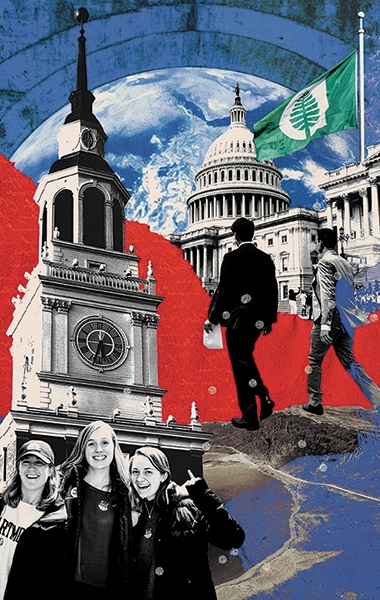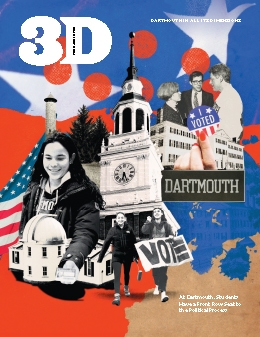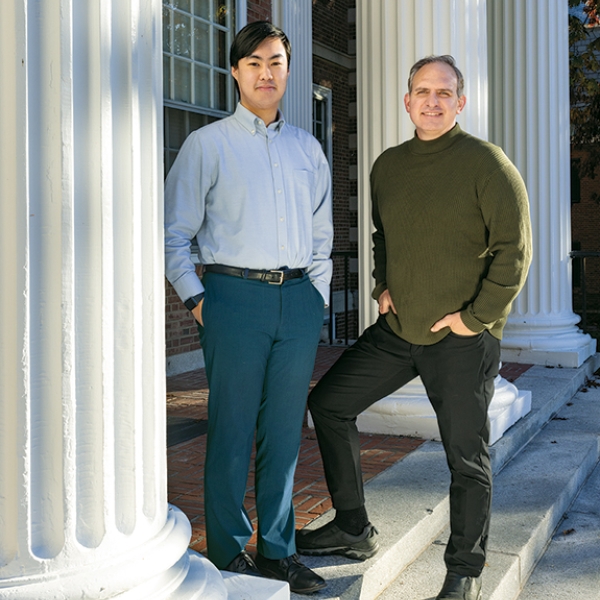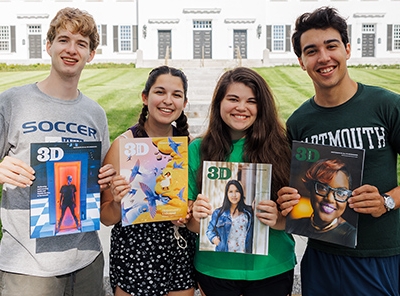One of the most vigorous engines in the country for the study of politics, policy, and leadership, Dartmouth is front and center in the quest for the U.S. presidency. That role has been reinforced by New Hampshire's historic position as the state with the first primary in the country, which draws to campus candidates across the political spectrum. Dartmouth was also the location of one of the most talked-about primary meet-ups of all time—the 2007 Democratic debate featuring all major candidates, including the eventual victor Barack Obama.
But the real source of Dartmouth's preeminence in the political arena is its deep bench of resources—expert faculty (including New Hampshire state congressman Russell Muirhead), alumni working in the upper echelons of politics, and an extensive array of experiential courses and programs.
One of the priorities driving Dartmouth's approach to political debate is developing a climate where all perspectives are welcome. Students are taught to conduct civil discourse—not just to avoid rancor but to increase knowledge and advance progress. The recently launched program Dartmouth Dialogues is designed to further promote a culture in which community members learn to engage in respectful discussion on all sides of issues and embrace the humanity of those with whom they disagree.
Agreeable Disagreements
"As citizens, we must be able to imagine the perspectives of those with opposite points of view. Students need to develop a capacious understanding of all sides of an issue. That's what it means to be educated," says Russell Muirhead, a member of the New Hampshire House of Representatives and the Robert Clements Professor of Democracy and Politics at Dartmouth. In the classroom, Muirhead shares with students his experiences from the floor of the New Hampshire legislature and asks them to give persuasive arguments for—and against—their firmly-held beliefs. "How do we oppose each other without hating one another? We need to work to understand the other side—especially when it seems beyond comprehension."
Muirhead, along with Doug Irwin and Meir Kohn, two professors from the economics department, launched the Dartmouth Political Economy Project (PEP) in an effort to reach a much deeper understanding of contemporary politics and policy. The PEP combines interdisciplinary perspectives on the pivotal relationships among economics, politics, and ethics. It asks students to address some of the knottiest dilemmas facing human societies.
"It all started when the three of us were talking about the 2008 financial crisis that nearly brought down the global economy. We got to thinking just how much our disciplines—government, politics, and economics—really engage the major questions of our political economy. The PEP was a natural outgrowth. Our goal is to cultivate debates that don't presuppose answers. Sometimes students change their minds. Sometimes they don't, and that's okay, too. We want to give students the resources to be more intelligent and articulate about their deeply held beliefs, whether they're Marxists or free-market conservatives."
The PEP brings in speakers of many political stripes, hosts debates, and sponsors courses that sometimes culminate in trips to other regions of the world—South America, for example, or Eastern Europe—that inform and challenge students' assumptions. "We are always looking for new things to try, in and out of the classroom. In our extracurricular student/faculty reading groups, for example, the PEP buys the books and the sandwiches, and we all just dig into the ideas. Finding new ways to explore is what makes being at Dartmouth so much fun."
Rocky Rocks Politics & Policy
Perhaps the jewel in the crown of Dartmouth's political universe is the Nelson A. Rockefeller Center for Public Policy and Social Sciences, an international catalyst for public policy research, teaching, and deliberation. Dedicated to providing nonpartisan, interdisciplinary perspectives on policy-related topics, the Rockefeller Center, commonly known as "Rocky," focuses on the ideals of public service and informed debate. That dedication translates into student opportunities like the iconic Policy Research Shop (PRS), a student-staffed,
faculty-mentored research enterprise in which students conduct policy research for government entities, often with the chance to testify on their findings.
Recent graduate Aidan Ferrin '24 from Bozeman, Montana considers his PRS experience a defining moment in his career arc and is now pursuing an accelerated master's in public health at Dartmouth's Geisel School of Medicine as a merit scholar. "My Policy Research Shop experience was pivotal and impactful. The project was sponsored by the Vermont State House of Representatives, and my group's assignment was to become familiar with Vermont S.25, a bill meant to control and regulate 14 chemical families of concern in menstrual products, cosmetics, and textiles. In the course of analyzing its potential environmental, health, and market impacts, the three of us grew in our understanding of the legislative process and the impact policy analysis can have on the process—even if it is conducted by students like us."
Dartmouth's view is that it's never too early in a student's college career to provide eye-opening, in-depth experiences in civil discourse. In Rocky's First-Year Fellows program, students engage in public policy at the very outset of their time at Dartmouth. Every year, two dozen students are selected for summer placement in a diverse range of policy internships in Washington. Fiona Hood '26, who grew up overseas but considers New Hampshire her home state, remembers the power of interacting with Dartmouth alumni mentors and developing professional experience during her First-Year Fellow internship with Congresswoman Annie Kuster '78 (D-NH).
"Making new friends, discovering a city more deeply, and getting high-level work experience—the First-Year Fellows program was everything I could hope for," Fiona says. "My time in D.C. allowed me not only to reflect but also to start growing into the person I strive to be. The skills I learned in and out of Congresswoman Kuster's office were invaluable. I continue to apply those skills to almost everything I do, from involvement in politics to conducting research on the expansion of nuclear energy. I will preserve the connections I created with Dartmouth alumni for years to come, and I hope one day to pay it forward to other Dartmouth students. First-Year Fellows confirmed to me that public policy will be a concrete aspect of my future career."
Similarly, the Judicial Fellowship Program offers internships around the country in which alumni in top judicial positions mentor Dartmouth undergraduates, giving them authentic insights into the complex U.S. judicial system. This year, the Center brought two judges forced to flee Afghanistan to campus as visiting scholars, giving students an inside perspective on the legal landscape of a different culture.






